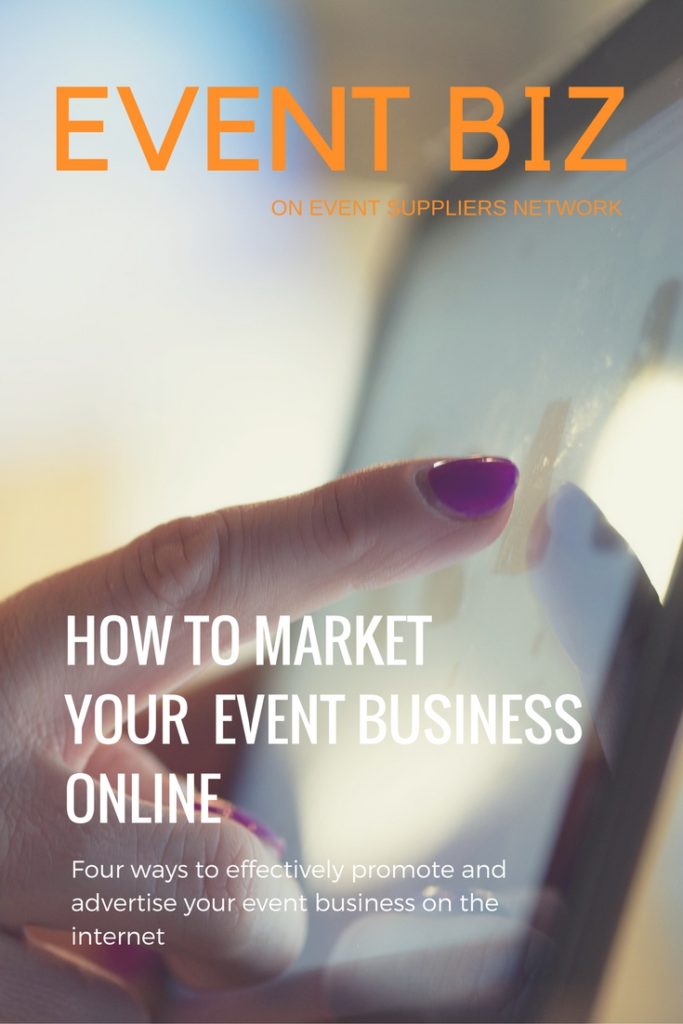Definition of digital marketing
“The marketing of products or services using digital channels to reach consumers. The key objective is to promote brands through various forms of digital media.
Digital marketing extends beyond internet marketing to include channels that do not require the use of the internet. It includes mobile phones (both SMS and MMS), social media marketing, display advertising, search engine marketing, and any other form of digital media.” – Financial Times Lexicon
When I started my career in sales and marketing back in the early 1990’s we relied on the distribution of printed brochures, print ads in newspapers and magazines, hosting customer seminars and face to face meetings with prospects to get the word out on products and services.
While all of these methods are still valuable today it is also vitally important that you understand and embrace digital marketing concepts as key ways to market your event planning business online.
Digital marketing for event planning business
Gary Vanynerchuk puts it best: “…most marketers are operating like it’s 2009.” For them digital marketing is simply creating a website, a Facebook page and establishing a Twitter account, but this is not enough. These are merely platforms from which we as business leaders and marketers must now creatively engage with both our existing and prospective clients.
A business website is so much more than a glorified online brochure. Its purpose is to keep your market informed of your products and services, educate on the benefits they bring to them (as consumers or businesses), as well as (and this is the really good part) to convert prospects who visit the site into paying customers. However if your target audience does not know about your website or worst yet, cannot easily find it when they search the internet, then none of these objectives will be realised. So how do you ensure that your business website is found?
The following tips can be applied in all types of businesses. However for purposes of this articles we will be providing examples from the hospitality and event industries for illustration purposes.
So here are 4 strategies that will drastically increase the chances of your venue or event business getting found on the internet:
1. Search Engine Optimisation (SEO) Plan
Although many businesses use ads on Google, Facebook, etc. to drawn traffic to their website, a good SEO plan allows your website to benefit from free traffic from Google, Bing and Yahoo. A great SEO plan will make sure that when persons are searching using the popular keywords in your industry that your website will appear on the first page of the search results.
For example: when persons search for “caribbean event venues” we have optimised our site so that it appears near the top of the first page of the search results.
— Your Action Item —
- Think about the keywords you’d like to rank for and use them throughout your site, including content, titles and META tags.
- To choose the right keywords, simply put yourself in your target user’s shoes and think of what you would type if you looking for your venue or event business.
Here are a few examples of keywords from your industry to give you an idea of how persons are searching for businesses like you:
– meeting venues toronto
– conference room chicago
– wedding catering bahamas
– grenada wedding photographers
Search Engine Optimisation is a very complex and in depth process which requires constant SEO maintenance and management to ensure that your website not only gets to the first page of key searches but maintains that position. The good news is that you do not have to struggle with this on your own. There are a number of SEO specialists around the globe that can assist you in this area. (If you would like us to conduct a preliminary evaluation of your site please do not hesitate to contact us.)
2. Improve Your Street Creds With The Search Engines (i.e. Google, Bing, Yahoo)
Although often included under the topic of SEO the importance of Inbound Links (or some call them “referrals”) to your website is an often understated component of your digital marketing strategy. The more inbound links a website has the more “street creds” your site has with search engines such as Google.
However, the source of these inbound links is equally as important as the quantity of links. Having more credible links could mean the higher your website maybe ranked in internet search results (which equals more free traffic from potential clients).
4 great ways of getting inbound links / referrals are:
(i) Engage with press in your country or city or event and hospitality industry bloggers about your venue or business. This can be a great source of referral traffic when they publish a post or article with a link to you.
You can also find out whether they invite guest bloggers and they can post an article of yours with a link back to your website.
(ii) Ask your fans, clients or business partners to add a link to your site on theirs.
(iii) Register your website in relevant directories and listings (e.g. Event Suppliers Directory, Yellow Pages, Yelp, etc.)
(iv) Look at the main referrals of your competitors to get some ideas of websites you could be engaging with.
3. Email Marketing
Social media and sales gurus, such as Kim Garst and Jeffrey Gitomer, remind us that one of the key tools in our marketing arsenal is the email list. Here is a “captive audience” that you can share daily, weekly or monthly updates on products, services, company news, etc.
I caution you on the frequency of your email updates. Know your audience! No need to inundate their Inbox too often as that can lead to them hitting the dreaded “Unsubscribe” at the bottom of the email or worst yet you get identified as a spammer! Personally I decided to send out emails monthly because I believe this is appropriate for my customer base. However if you are into retail and there are new sales, deals or products happening on a daily basis your customers maybe ok with receiving your updates more often.
At the end of the day make sure that your email message includes links that will direct the reader back to your website. That way your website is not just taking up space in the “cloud”. It is actually functioning as a vital tool in your sales and marketing arsenal.
There are a number of tools out there to make email marketing more manageable for us. Our company uses MailChimp but AWeber and Constant Contact are two other tools used by businesses of all sizes to communicate their message to a wider audience.
Don’t have an existing email list and wonder how to start? Well maybe that collection of business cards in your desk drawer would be a good start! Adding existing clients is also a must because you want to keep them informed. Do not hesitate to add family and friends to the email list. They in turn can share the email with others who may themselves “subscribe” to your list and, if they are interested become your newest client!
Also always give your website visitors the ability to “opt in” to the email list. Many of the email marketing tools have widgets or links that that you can add to your website so that persons can add their email to the list for regular updates.
One other important note is to be fully aware of the current Anti-Spam legislation that may be in effect in the countries that you are marketing to. In Canada we have the CASL which came effect on July 1, 2014. (You can read more about CASL here.)
4. Social Media Marketing
I know…there are so many social media tools out there. Facebook, Twitter, LinkedIn, Instagram, Periscope, Pinterst, Google+, SnapChat, Youtube, … and the list keeps growing.
However, social media marketing (or what I like to call social biz marketing) is not a luxury. It is an essential and cost effective way in connecting with your customers and prospects in the 21st century.
I hope to go more in depth into social media marketing in subsequent articles but suffice to say “Cold Calling as we know it is DEAD ’cause social media made it warmer.”
One word of advice: Don’t spread yourself too thin by trying to be a master of all of them. Your target audience will determine where you should place you greatest focus. Rule of thumb is to initially select the top three (3) tools that you should focus on. We will definitely devote some more time exploring the effective use of social media marketing.
It is my hope that you have found the information in this article useful to you and your business. Really would like to hear from you so in the comments section below share how you are using digital marketing in your business today and some lessons learnt in the process.
Looking forward to sharing with you soon again.





